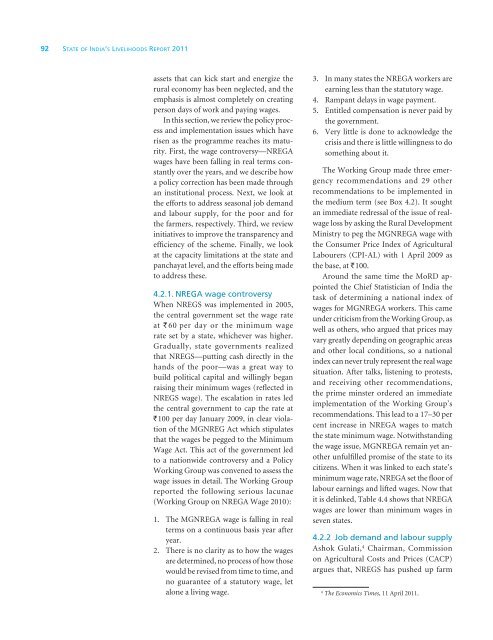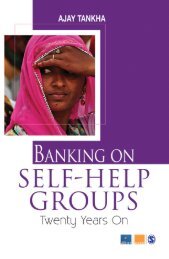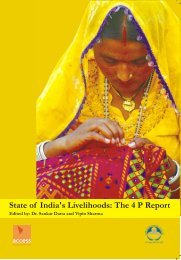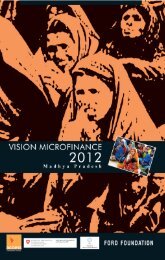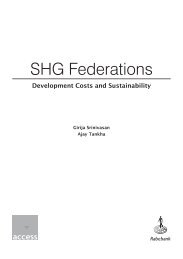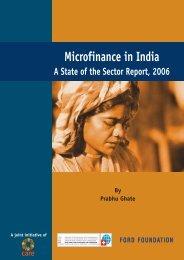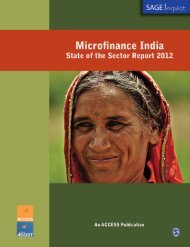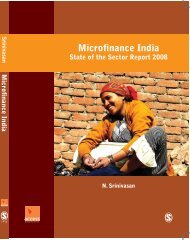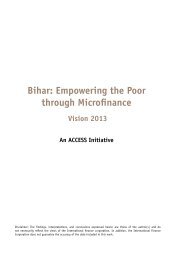SOIL Report 2011 - ACCESS Development Services
SOIL Report 2011 - ACCESS Development Services
SOIL Report 2011 - ACCESS Development Services
- No tags were found...
Create successful ePaper yourself
Turn your PDF publications into a flip-book with our unique Google optimized e-Paper software.
92 State of India’s Livelihoods <strong>Report</strong> <strong>2011</strong>assets that can kick start and energize therural economy has been neglected, and theemphasis is almost completely on creatingperson days of work and paying wages.In this section, we review the policy processand implementation issues which haverisen as the programme reaches its maturity.First, the wage controversy—NREGAwages have been falling in real terms constantlyover the years, and we describe howa policy correction has been made throughan institutional process. Next, we look atthe efforts to address seasonal job demandand labour supply, for the poor and forthe farmers, respectively. Third, we reviewinitiatives to improve the transparency andefficiency of the scheme. Finally, we lookat the capacity limitations at the state andpanchayat level, and the efforts being madeto address these.4.2.1. NREGA wage controversyWhen NREGS was implemented in 2005,the central government set the wage rateat ` 60 per day or the minimum wagerate set by a state, whichever was higher.Gradually, state governments realizedthat NREGS—putting cash directly in thehands of the poor—was a great way tobuild political capital and willingly beganraising their minimum wages (reflected inNREGS wage). The escalation in rates ledthe central government to cap the rate at`100 per day January 2009, in clear violationof the MGNREG Act which stipulatesthat the wages be pegged to the MinimumWage Act. This act of the government ledto a nationwide controversy and a PolicyWorking Group was convened to assess thewage issues in detail. The Working Groupreported the following serious lacunae(Working Group on NREGA Wage 2010):3. In many states the NREGA workers areearning less than the statutory wage.4. Rampant delays in wage payment.5. Entitled compensation is never paid bythe government.6. Very little is done to acknowledge thecrisis and there is little willingness to dosomething about it.The Working Group made three emergencyrecommendations and 29 otherrecommendations to be implemented inthe medium term (see Box 4.2). It soughtan immediate redressal of the issue of realwageloss by asking the Rural <strong>Development</strong>Ministry to peg the MGNREGA wage withthe Consumer Price Index of AgriculturalLabourers (CPI-AL) with 1 April 2009 asthe base, at `100.Around the same time the MoRD appointedthe Chief Statistician of India thetask of determining a national index ofwages for MGNREGA workers. This cameunder criticism from the Working Group, aswell as others, who argued that prices mayvary greatly depending on geographic areasand other local conditions, so a nationalindex can never truly represent the real wagesituation. After talks, listening to protests,and receiving other recommendations,the prime minster ordered an immediateimplementation of the Working Group’srecommendations. This lead to a 17–30 percent increase in NREGA wages to matchthe state minimum wage. Notwithstandingthe wage issue, MGNREGA remain yet anotherunfulfilled promise of the state to itscitizens. When it was linked to each state’sminimum wage rate, NREGA set the floor oflabour earnings and lifted wages. Now thatit is delinked, Table 4.4 shows that NREGAwages are lower than minimum wages inseven states.1. The MGNREGA wage is falling in realterms on a continuous basis year afteryear.2. There is no clarity as to how the wagesare determined, no process of how thosewould be revised from time to time, andno guarantee of a statutory wage, letalone a living wage. 4The Economics Times, 11 April <strong>2011</strong>.4.2.2 Job demand and labour supplyAshok Gulati, 4 Chairman, Commissionon Agricultural Costs and Prices (CACP)argues that, NREGS has pushed up farm


